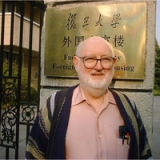Awards
- IU Indianapolis Spirit of Philanthropy Award - 2002

Charls Pearson is director of Research for the American Semiotics Research Institute. His re-search interests include the philosophical and scientific foundations of semiotics, experimental semiotics, theoretical semiotics, mathematical semiotics, as well as applied semiotics in the areas of information science, logic, theology, linguistics, philosophy, psychology, semiotics of music, and semiotics of law. He is the developer of the Semiotic Paradigm. He discovered many of the laws of semiotics and has invented many semiotic instruments.
In developing the Semiotic Paradigm, he also developed both its theories: the Universal Sign Structure Theory, (USST); and the Theory of Operational Semiotics, (TOS). He also developed the experimental methodology, the mathematical methodology, and the language of the Semiotic Paradigm. He is also active in philosophical research in areas where the USST and the TOS play a critical role. Professor Pearson is a student of the works of the American philosophers Charles Peirce, and Charles Morris. He serves as the People’s Ambassador to China for Logic, Semiotics, and Peirce Studies. He is a member of the Development Committee for the Peirce Edition Project at Indiana University Purdue University at Indianapolis’s Institute for American Thought; a member of the Advisory Board for the Center for Studies of Dewey and American Philosophy at Fudan University; Chair of the Advisory Board for the Center for Studies of Peirce and American Philosophy at Wuhan University;and Chair of the Advisory Board for the Center for Semiotics Research at the Chinese Youth University for Political Science. He is an associate editor for the international journal, CNN, the Chinese Journal of Semiotic Studies, consulting editor for the international journal,Cybernetics and Human Knowing, and member of the editorial board for
Sign: the International Journal of Semiotics.
He received a B.A.J. in science reporting from The Ohio State University School of Journalism; an MS in physics from the University of Cincinnati; an MS in information science from the Georgia Institute of Technology; and the Ph.D. in semiotics from the Georgia Institute of Technology. His Ph.D. was the first doctorate awarded in semiotics in the U.S.